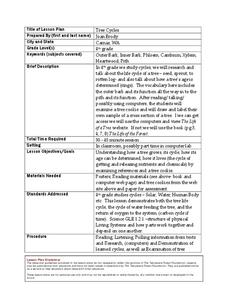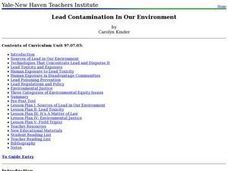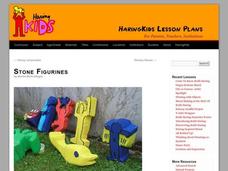Curated OER
Sequencing the Cystic Fibrosis Gene: A Simulation
Ninth graders determine nucleotide sequences. They identify those base sequences that are normal, those that are normal variants and those that cause cystic fibrosis. Students use DNA nucleotide sequences to determine amino acid...
Curated OER
Clam Anatomy
Students are introduced to the anatomy of the inside and outside of a clam before dissecting the animal. During the dissection, they label and identify the function of each part they see including the outside of the clam. They complete...
Curated OER
Making a Model Lung
Students explain the parts of the body that are involved in breathing and explore lung function. In this model lung lesson students make a model of a lung then interpret and explain it.
Curated OER
Symmetry in Butterflies
Students create a butterfly displaying a mirror image of itself to show that it is symmetrical. In this symmetry lesson plan, students go over symmetry in different shapes and identify patterns in butterflies.
Curated OER
Cloze Passage: Mammals in the Sea
In this mammals in the sea cloze procedure worksheet, students fill in the 12 missing words in the passage to help identify their reading level.
Curated OER
Tree Cycles
Fourth graders investigate the life cycle of a tree by researching the Internet. In this plant life lesson, 4th graders observe The Life of a Tree website and discuss the life of a tree from sprout to death. Students create a...
Curated OER
Secrets of the Ocean Realm - Survival in the Sea
Students determine the sequential links in a marine food chain and identify the roles that various organisms play in this chain. Students develop charts as visual aids for illustrating marine food chains.
Curated OER
Project Geode
Students predict the appearance of a geode's internal structure based on its mass and density. They form a hypothesis based on the data they collect. They also identify common minerals found in Illinois.
Curated OER
Mussel Anatomy Lesson Plan
Students identify the parts and functions of a mussel. They explain how its physical adaptations help it survive in its habitat. They label the parts as a quiz to complete the lesson.
Curated OER
Chemical Compounds
For this chemical compounds worksheet, learners identify the types of intermolecular forces present in the given substances, calculate the heat required to convert a liquid to gas, and explain the ideal-gas law. This worksheet has 5...
Curated OER
Clean Air: Our Health Matters
Students learn about the human respiratory system. In this pollution instructional activity, students identify the parts of the respiratory system and what happens to them when they breathe in polluted air. Students learn about the...
Curated OER
Stay Well
Students complete a three part activity lesson to identify elements of longevity in life expectancies and health. In this life expectancies lesson, students read background information about life expectancy data, and visit links to for...
Curated OER
Earth's Atmosphere and Temperature
Students explore the layers of earth's atmosphere and conduct an experiment to identify carbon dioxide. They construct models using styrofoam to represent molecules in the atmosphere's layers. To discover how sunlight efffects...
Curated OER
Lead Contamination In Our Environment
Pupils identify the sources of lead in their local community and how to prevent further contamination. As a class, they watch a video about the effects of lead on the body and use the internet to discover any new technology that can...
Curated OER
Rosie's Walk
Learners use maps and globes to locate and describe locations, directions and scale. Using the maps, they identify man made or natural features of different environments. They practice using geographical terms to describe a specific...
Curated OER
Roll Out the Run-ons
Students participate in activities in order to investigate the concept of run-on sentences. They identify a complete sentence and the correct characteristics that it possesses.
Curated OER
Something's Fishy
Students study fish habits and traits. For this marine life lesson, students complete four learning centers of a fish memory game, a fish habitat study, draw and glue fish craft activity, and a fish read-a-thon. Students complete their...
Curated OER
Saving Big Cats from Extinction
Students explore extinction. In this biology and environmental science instructional activity, students define extinction, identify what living things need to survive, and create a persuasive poster about "saving the big cats"...
Curated OER
Sponges and Cnidarian Crossword Puzzle
In this marine science instructional activity, students complete a crossword puzzle with 32 questions on sponges and cnidarian. They identify the different characteristics of sponges and cnidarian.
Curated OER
Stone Figurines
Students analyze visual arts by examining images on the Internet. In this figurine lesson, students research Keith Haring's artwork on the web and identify his body movement artistic style. Students utilize soft stones, carving...
Curated OER
Getting to Know the Seven Continents
Young scholars are introduced to basic map and globe skills. Using the internet, they identify and locate the seven continents and complete a blank map to reinforce the names of the continents. They also distinguish between land masses...
Curated OER
Rainy Day Hike
Students develop awareness about the water cycles. They identify the watershed in which their school is located. They explain the role the schoolyard plays in the watershed.
Curated OER
Quarters from the Coast
Pupils examine the Maine state quarter and discuss the features on the quarter that identify Maine as a coastal state. They identify coastal states and inland states on a map.
Curated OER
What is a Cloud?
Third graders identify a cloud and explore how they form. They create an acrostic poem about clouds.

























